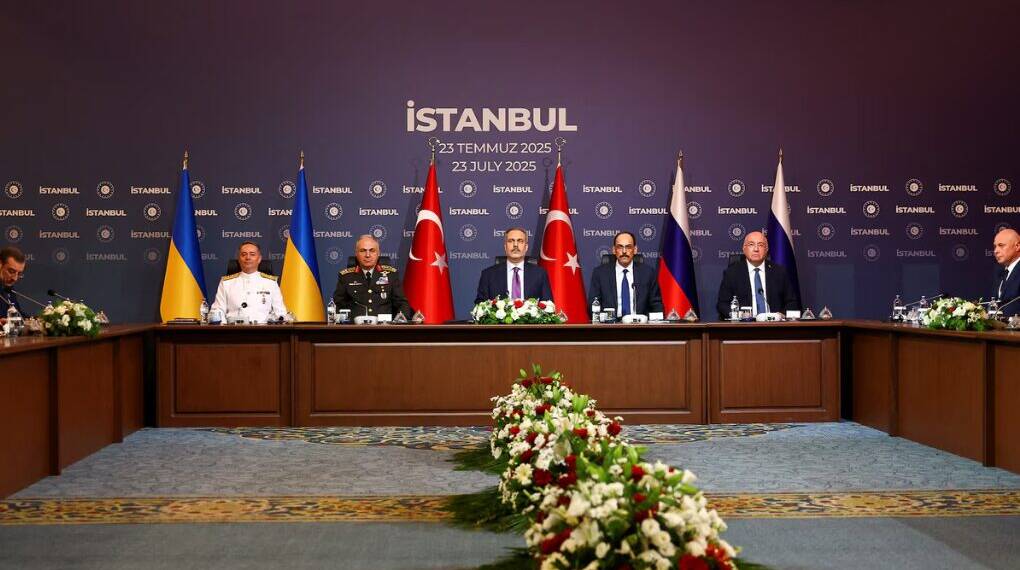The third round of Russia-Ukraine peace talks held in Istanbul on July 23, 2025, was a brief but significant diplomatic event amid the ongoing conflict, lasting less than an hour and involving key humanitarian discussions alongside persistent strategic disagreements. These talks were chaired by Turkish Foreign Minister Hakan Fidan and included senior representatives from both Moscow and Kyiv, alongside Turkish intelligence and military officials facilitating the dialogue.

Ceasefire Proposal and Strategic Divergence
Russia offered a very limited ceasefire proposal, suggesting a pause of just two to three days in specific frontline sectors. This narrow window was aimed primarily at humanitarian goals—allowing medical teams to retrieve bodies of fallen soldiers and enabling short-term pauses for civilian relief. This offer reflects Russia’s broader peace conditions that remain largely unchanged, demanding that Ukraine formally adopt a neutral status, recognize Russian control over occupied regions including Donetsk, Lugansk, Kherson, Zaporizhzhia, and Crimea, and provide guarantees for the rights of Russian-speaking citizens within Ukraine. Moscow’s insistence ties any ceasefire and peace process directly to these political and territorial conditions.
In stark contrast, Ukraine insists on a full and unconditional ceasefire as a prerequisite for substantive peace negotiations. Kyiv demands a complete halt to all strikes, especially against civilian populations and critical infrastructure, across the entire frontline. Ukraine sees this comprehensive cessation of hostilities as necessary for creating a genuine environment conducive to diplomatic progress.
The Ukrainian delegation, led by Rustem Umerov, Secretary of the National Security and Defense Council, came prepared to push this agenda strongly and proposed a high-level summit between Presidents Vladimir Putin and Volodymyr Zelenskyy, potentially by the end of August 2025. Notably, Ukraine suggested involving U.S. President Donald Trump and Turkish President Recep Tayyip Erdogan as instrumental figures to help facilitate this summit and lend diplomatic weight.
Russia, however, remained resistant to the idea of an early summit or broad negotiations before an agreement on peace terms had been finalized, viewing a presidential meeting as only suitable for signing a deal rather than discussing or negotiating one. This position highlights a fundamental impasse: Russia ties negotiations tightly to its political conditions, while Ukraine insists on security and sovereignty guarantees achieved through an immediate and verifiable ceasefire.
Humanitarian Breakthrough: Prisoner Exchanges and Body Returns
Despite the sharp strategic differences, the talks did produce meaningful humanitarian outcomes. The two sides agreed to exchange approximately 1,200 prisoners of war each, including sick and seriously wounded soldiers in an “all for all” swap. They also consented to return the bodies of thousands of fallen soldiers to their respective countries. These agreements build on previous rounds of talks, which have achieved similar prisoner swaps and repatriations, indicating that while political negotiations remain stalled, humanitarian cooperation persists as a crucial channel for dialogue and confidence-building.
Diplomatic Obstacles
The Istanbul talks reflect ongoing attempts by Türkiye as a mediator to encourage dialogue between Russia and Ukraine. Turkish officials, including Fidan and intelligence chiefs, emphasize the urgency of ending the bloodshed and seek result-oriented negotiations aimed at a ceasefire and eventually, peace.
Nonetheless, expectations for a breakthrough remain low among international observers and participants. The talks’ brevity and limited agenda underscore the entrenched mistrust and vastly different red lines each side holds. Moscow’s approach signals a tactical willingness for short-term humanitarian pauses without relinquishing its core territorial and political demands. For Kyiv and its Western supporters, any ceasefire must be comprehensive and verifiable, integrated into a process respecting Ukraine’s sovereignty and territorial integrity.
The third round of Istanbul peace talks illustrates a persistent diplomatic stalemate within a difficult conflict landscape. Russia’s limited ceasefire proposal and rigid political conditions contrast starkly with Ukraine’s calls for a full ceasefire and high-level summit to resolve the war comprehensively. While no extended ceasefire agreement or summit was finalized, significant humanitarian progress through prisoner exchanges highlights the narrow but vital spaces for cooperation.
The future of negotiations likely depends on bridging this deep divide, with international mediation playing a critical role in balancing Moscow’s strategic aims and Kyiv’s insistence on sovereignty and security. Until these core issues are addressed, dialogue may continue without a substantive peace settlement.








